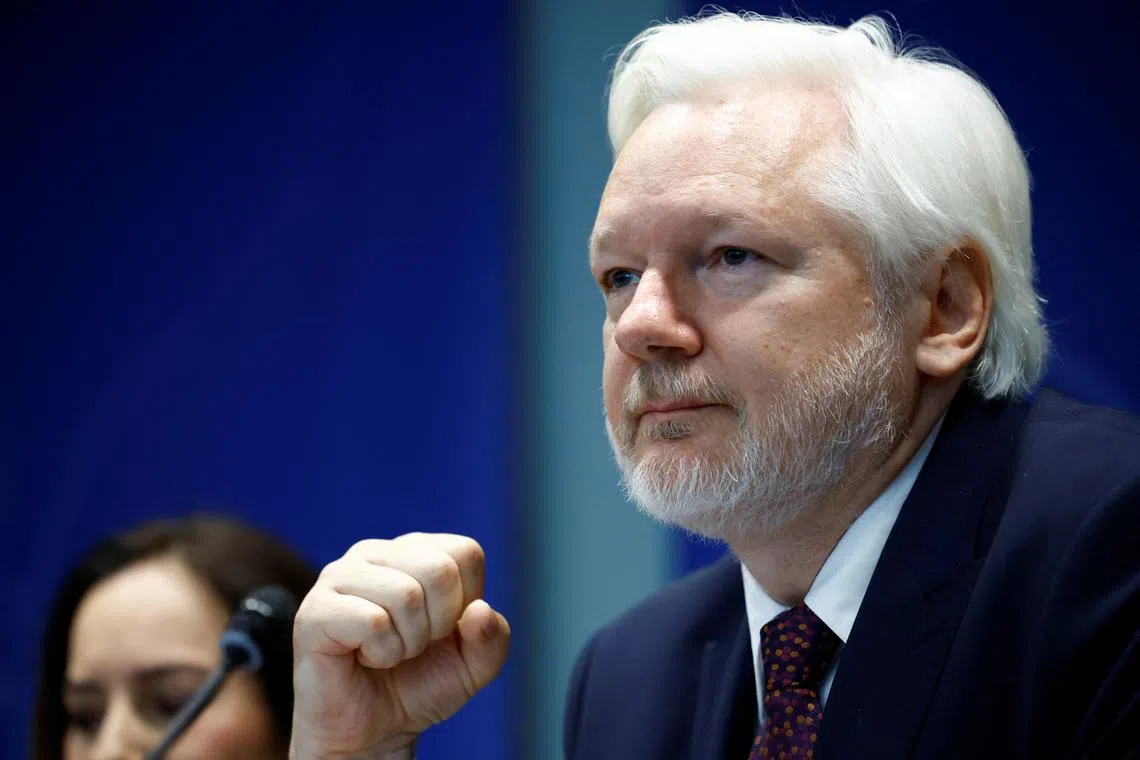‘I pleaded guilty to journalism,’ WikiLeaks’ Assange tells rights body
Sign up now: Get ST's newsletters delivered to your inbox

WikiLeaks' founder Julian Assange says he chose freedom “over unrealised justice”.
PHOTO: REUTERS
Follow topic:
STRASBOURG – WikiLeaks founder Julian Assange on Oct 1 said he was released after years of incarceration only because he pleaded guilty to doing “journalism”, warning that freedom of expression was now at a “dark crossroads”.
“I am not free today because the system worked. I am free today after years of incarceration because I pleaded guilty
The Parliamentary Assembly of the Council of Europe (Pace) had issued a report expressing alarm at Mr Assange’s treatment, saying it had a “chilling effect on human rights”.
Mr Assange spent most of the last 14 years either holed up inside the Ecuador Embassy in London to avoid arrest or locked up at Belmarsh Prison in London.
He was released from jail in June
The trove of confidential documents released by WikiLeaks included searingly frank US State Department descriptions of foreign leaders, accounts of extrajudicial killings and intelligence gathering against allies.
Mr Assange returned to Australia in June and had since not publicly commented on his legal woes or his years behind bars.
“I eventually chose freedom over unrealisable justice... Justice for me is now precluded,” he said, noting he had been facing a 175-year jail sentence.
Speaking calmly and flanked by his wife Stella, who fought for his release
Mr Assange said: “The fundamental issue is simple. Journalists should not be prosecuted for doing their jobs.”
He argued that his case provided an insight into “how powerful intelligence organisations engage in transnational repression” against their foes, adding that this “cannot become the norm here”.
‘More impunity, more secrecy’
Mr Assange said he could have lost years more of his life had he tried to fight his case all the way.
“Perhaps, ultimately, if it had gotten to the Supreme Court of the United States, and I was still alive... I might have won,” he said.
“But, in the meantime, I had lost 14 years under house arrest, embassy, siege and maximum security prison.”
He said that during his incarceration, “ground has been lost”, regretting that he now sees “more impunity, more secrecy and more retaliation for telling the truth”.
“Freedom of expression and all that flows from it is at a dark crossroads,” he told the hearing of the legal committee of Pace.
“Let us all commit to doing our part to ensure the light of freedom never dims and the pursuit of truth will live on and the voices of many are not silenced by the interests of the few,” he said.
Mr Assange’s case remains deeply contentious. Supporters hail him as a champion of free speech and say he was persecuted by the authorities and unfairly imprisoned. Detractors see him as a reckless blogger whose uncensored publication of ultra-sensitive documents put lives at risk and jeopardised US security.
US President Joe Biden, who is likely to issue some pardons before leaving office in January 2025, has previously described Mr Assange as a “terrorist”.
Mr Assange’s timing and his choice of venue have puzzled some observers.
The Council of Europe brings together the 46 signatory states of the European Convention on Human Rights, with little say over Mr Assange’s legal fate.
Mr Assange is still campaigning for a US presidential pardon for his conviction under the Espionage Act.
Professor Holly Cullen, who teaches law at the University of Western Australia, said ahead of the hearing that Mr Assange might “need to be a bit more restrained until the pardon issue is resolved” in criticising the US.
“The US First Amendment seems pretty black and white to me... Congress shall make no law restricting speech or the press,” Mr Assange said on Oct 1.
“However, the US Constitution, those precedents relating to it, were just reinterpreted away” in his case, he claimed. AFP

